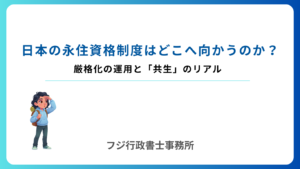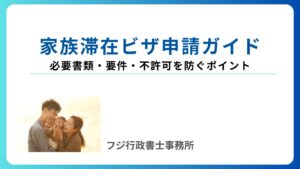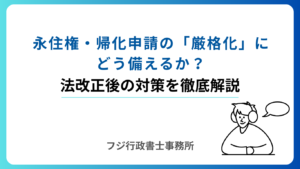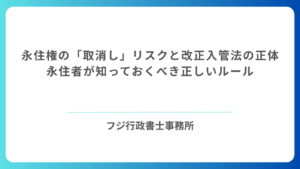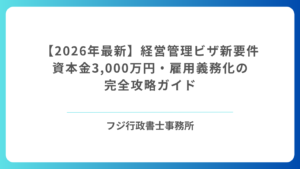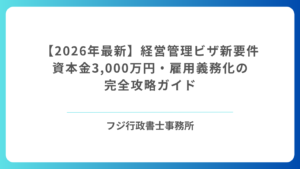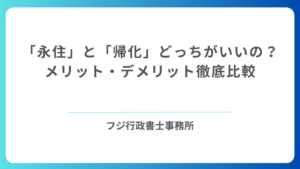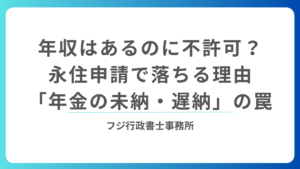【最新】ビザ審査で見られる「信用情報」って何?知らずに落ちる5つの落とし穴
在留資格の審査が“書類だけ”ではなくなっている
ビザの更新や変更、永住・帰化などの申請では、提出する書類だけで判断されると思われがちです。しかし実際には、入管は「申請者の信用情報」も総合的に見て判断しています。つまり、表面の情報だけでなく、過去の行動・義務の履行状況までチェックされているということです。
When applying for visa renewals, changes, or permanent residency, many people assume that only the submitted documents matter. In reality, immigration officials also consider the applicant’s credibility—including past conduct and how well they’ve fulfilled legal obligations.
落とし穴①:税金の未納や滞納
市区町村の住民税を払っていない、または支払いが遅れている場合、それだけで「義務を果たしていない人」と見なされ、審査で不利になります。たとえ収入が少なくても、納税義務がある限りは申告・納付が必要です。延滞している場合は早めに役所で相談しましょう。
Failing to pay local residence taxes—or paying them late—can make immigration authorities question your trustworthiness. Even if your income is low, tax filing and payment are still required. If you’re behind, consult your local office as soon as possible.
落とし穴②:社会保険料や年金の未加入
会社に勤めているのに健康保険や厚生年金に入っていない、あるいは個人で国民年金に加入していない場合、入管から「法令を守っていない」と判断されることがあります。在留期間が長いほど、こうした履歴は重要になります。
If you’re employed but not enrolled in health insurance or employee pension programs, or if you haven’t joined the National Pension as a self-employed person, it may be seen as non-compliance with Japanese law. The longer your stay, the more important this becomes.
落とし穴③:住民票の放置や二重登録
引っ越しをしても住民票を移していない、または複数の場所に住民登録しているような状態も、信頼性を損なう要因です。入管は「実態に合った登録かどうか」を見ているため、引っ越し後は必ず14日以内に住所変更を届け出ましょう。
Failing to update your residence record after moving—or having multiple registrations—can damage your credibility. Immigration checks whether your records reflect your real living situation, so always update your address within 14 days of moving.
落とし穴④:転職・退職時の届け出忘れ
「技人国」や「特定技能」などの就労ビザを持っている人は、会社を辞めたり転職した際に、入管へ届け出を行う義務があります。これを怠ると、無断で活動内容を変更したとみなされ、次回の更新で不利になる恐れがあります。
If you hold a working visa like “Engineer/Specialist in Humanities/International Services” or “Specified Skilled Worker,” you must notify immigration when you change or leave jobs. Failure to do so may be seen as unauthorized activity and hurt your chances of renewal.
落とし穴⑤:公共料金や医療費の滞納
一見ビザと無関係に思える水道・電気・ガス代、そして病院での医療費なども、支払いを怠ることで「日本での生活能力に不安あり」と判断されることがあります。特に永住や帰化の審査では、こうした履歴もチェックされます。
Unpaid utility bills or hospital fees may seem unrelated to immigration, but they can raise concerns about your financial stability. This is especially important when applying for permanent residency or naturalization, where a full review of your lifestyle is conducted.
審査の視点は「制度を守る姿勢があるか」
入管は申請者に対して「制度を理解し、義務を果たす意思と実績があるか」を見ています。外国人であっても日本の社会の一員として扱われる以上、信用を失う行為は審査でマイナスに働きます。小さな義務の積み重ねが、将来のビザや永住に大きく影響するのです。
Immigration looks for signs that applicants understand and respect the rules. Foreign residents are expected to act as responsible members of society. Failing to do so—even in small ways—can seriously affect future visa or residency applications.
心配なときは専門家に相談を
「過去に未納があったかもしれない」「住所変更を忘れていた」など、不安な点がある場合は、できるだけ早く行政書士などの専門家に相談することをおすすめします。自己判断で申請を進めるより、プロの視点で準備する方が、結果としてスムーズなビザ取得につながります。
If you’re unsure whether your past actions might affect your application, consult an expert such as an administrative scrivener. Professional support can help you prepare thoroughly and improve your chances of success.
あわせて読みたい
お問い合わせ
👉 LINE公式アカウントはこちら
または、下のQRコードをLINEアプリで読み取ってください。



